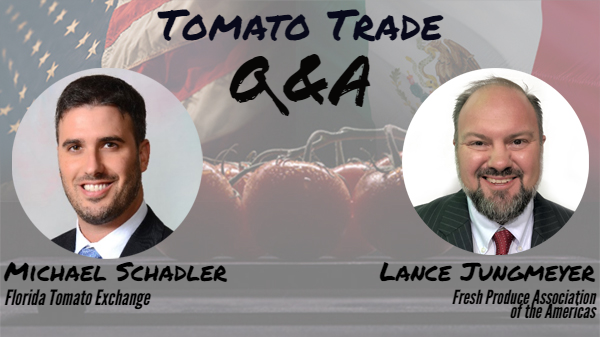As the Department of Commerce (DOC) investigates dumping of Mexican tomatoes in the U.S., Blue Book reached out to spokesmen on each side of the suspension agreement dispute, Michael Schadler, executive vice president of the Florida Tomato Exchange, and Lance Jungmeyer, president of the Fresh Produce Association of the Americas BB #:144354, for a question-and-answer piece.
1. What’s the Dept of Commerce’s timeline in the antidumping investigation?
Schadler: The antidumping investigation is a two-tiered process. The DOC is investigating whether Mexican exporters dumped tomatoes and the ITC (International Trade Commission) is investigating whether dumped tomatoes from Mexico caused injury to domestic producers. The DOC side of the investigation will be completed by Sept. 19 unless a new suspension agreement is reached before then. The ITC investigation will be completed by Nov. 4.
Jungmeyer: The ITC is handling the final investigation. Commerce is also doing a parallel investigation, which will wrap up before ITC. Last week Commerce came out with a post-preliminary ruling of 25% injury that appears to be out of sync with market data. The Mexican growers are challenging the calculations that Commerce used, because they are so different from what the growers submitted, which was 0%.
2. What are the chances of an agreement or compromise before the investigation concludes?
Schadler: The chances for a new suspension agreement are looking less likely at the moment because the sides are still quite far apart, and time is running out. It’s my understanding that a new agreement would need to be reached by around August 20 to comply with the 30-day comment period before the September 19 end date of the DOC investigation.
Jungmeyer: As an interested party and representing the importing companies who are paying the duties, we are seeking a fair solution. Unfortunately, Commerce continues to revert to proposals that the Florida Tomato Exchange first sought in November of 2017. Those proposals, which called for 100% USDA inspections and for buyers to give up their PACA rights when purchasing Mexican tomatoes, are still on the table as of the July 17 proposal. It doesn’t seem like Commerce is interested in a fair solution for all interested parties.
3. What are the key points for U.S. growers to an agreement?
Schadler: The key points for U.S. growers have always been the elimination of loopholes and improving enforceability of any new agreement. Without an agreement that can be effectively monitored and enforced, there’s no reason to have a suspension agreement.
What are the key points for Mexican importers to an agreement?
Jungmeyer: FPAA represents American companies who import, distribute and market produce from Mexico. We were founded in Nogales, Arizona, in 1944, and many of our companies are on their third and fourth generation of family leadership. As fruit and vegetable distributors, we have been competing in the market for many years, bringing innovations including vine-ripened and specialty tomatoes in retail-ready packs. This is the direction that consumers are going, and it’s why supermarkets sell Mexican tomatoes.
We are now seeing an artificial price increase on these tomatoes. The duties are unjustified, and they are putting the businesses of longtime distributors at jeopardy, to artificially support the dwindling mature-green tomato industry. So, really, none of this makes any sense.
Here is what we want in the agreement:
-We want the 100% Border Inspection Mechanism removed. The high quality of Mexican tomatoes is the reason these tomatoes are grabbing market share. Any mandatory inspection beyond the existing Tomato Marketing Order is unjustified. Presently only round field tomatoes are inspected, and this accounts for less than 8% of all tomatoes imported from Mexico. Only 0.02% were declared out of grade. Even at destination with receivers, less than 1% of tomato shipments failed grade. Any additional time this unnecessary inspection will take is a brake on the flow of trade.
-In no way should the new agreement limit the rights of buyers to collect breach of warranty claims. Yet that is exactly what the new proposed agreement does by creating an advantageous path to market for repacking firms that sell Mexican tomatoes – including primarily Florida Tomato Exchange-affiliated repacking firms. Other longtime sellers of Mexican tomatoes instead would have their ability to offer redress to a purchaser essentially taken away. In simple terms, the new proposal creates a market advantage for one kind of company selling Mexican tomatoes and disadvantages the other kind. That’s not fair. Plus, it adds costs that will be borne by consumers.
4. What do you see as evidence of current Mexican tomato dumping in the U.S.?
Schadler: Whenever the market becomes oversupplied, there are always significant volumes of Mexican tomatoes in the U.S. being sold at below dumped values. This is most clearly evident in terminal markets. But none of that matters to the investigation. The DOC and the ITC are independently reviewing the data as we speak and will come to their own determination at the end of the investigation.
What do you say to the charge that Mexican tomato growers are dumping in the U.S.?
Jungmeyer: Buyers purchase the tomatoes they want to buy. Recent USDA/AMS sales data shows California open field tomatoes going for $7 a box, and Mexican tomatoes at $12-14 a box. This is the market. As for charges of dumping, the methodology of Commerce is being challenged by the Mexican growers.
5. What have you heard from retail and foodservice buying groups about this dispute? Any official support for your members?
Schadler: Obviously there is interest from all companies on the supply and buy side of the business. I believe everyone is hopeful that any agreement – if there is one – would be balanced and equitable for both sides.
Jungmeyer: Walmart has weighed in. This retailer supports a broad supply chain in its retailing efforts, including domestic and imported produce. In a letter, which was filed on the record by the Tomato Division of the FPAA with the Department of Commerce, Walmart stated the following: “Walmart is committed to sourcing as much food as we can domestically. Last year we sourced tomatoes from 21 states across the U.S. from growers, shippers and packers of all sizes. In fact, we have seen strong double-digit growth in our local sourcing program for tomatoes (which we define as sourced and sold within the same state). However, to meet customer demand for supply and variety, we also rely on imported tomatoes from Mexico and Canada.
“We have a commitment to our customers to keep our shelves stocked with high-quality, healthy and affordable produce that they’ve come to expect when shopping at Walmart. Any policies that limit supply or increase prices on fresh produce is a disservice to American consumers’ health and well-being.”



